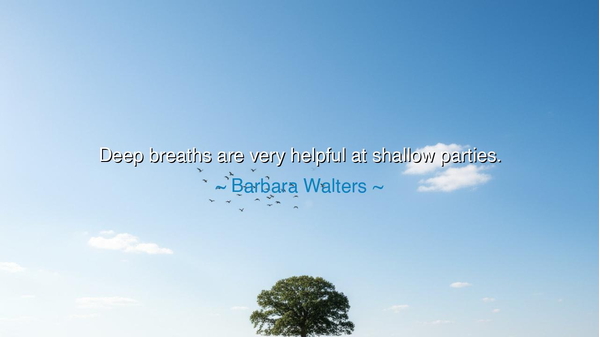
Deep breaths are very helpful at shallow parties.






When the wise Barbara Walters spoke the words, “Deep breaths are very helpful at shallow parties,” she did not merely jest about social gatherings. She revealed a profound truth about the human spirit in the face of superficiality. There are times when the air around us feels thin, filled not with the fragrance of meaningful dialogue, but with the stale smoke of trivial talk. In such moments, the soul hungers for grounding. And it is then, she reminds us, that we must turn inward and take deep breaths—an act both physical and spiritual—that steadies the heart when the world feels shallow.
The origin of this thought is found in Walters’ own life as a journalist and social figure. She moved often in the spheres of wealth, power, and influence, where parties and gatherings were the backdrop of her work. Yet she saw with clear eyes how often these spaces, adorned with glitter, lacked the substance of truth. Her words carry both wit and wisdom: in the midst of shallow waters, one must breathe deeply, lest the spirit suffocate. It is a reminder that the depth we seek must sometimes be drawn from within when the environment around us offers none.
This wisdom has been tested through history. Consider the story of Marcus Aurelius, the Roman emperor who was surrounded by flattery, politics, and endless distractions. To endure the shallowness of the imperial court, he turned inward, breathing deeply through meditation and reflection, writing his Meditations as a way to remain anchored in truth. His “deep breaths” were the practices of philosophy, which gave him strength to withstand the trivialities and intrigues of the world around him. Just as Walters counseled, he found depth in himself when the external world was lacking.
The deep breath also symbolizes patience, restraint, and clarity. In shallow conversations, one is tempted to withdraw in disdain or to lash out in frustration. But the one who breathes deeply chooses another path: calm endurance. To breathe deeply is to remember that one’s own peace is not determined by the noise of others. It is an inner act of sovereignty, where the spirit asserts, “I will not drown in shallow waters, for I carry depth within me.”
There is also a lesson here for the gatherings of life beyond parties. In workplaces filled with gossip, in meetings that circle endlessly without meaning, in societies obsessed with image rather than truth, the art of the deep breath remains. It is the shield of the mindful, the tool of those who refuse to be diminished by shallowness. Through breath we reclaim perspective, remembering that trivial moments are but passing clouds against the greater sky.
From Walters’ words we learn that wisdom need not always roar; sometimes it sighs gently. A single breath can be an anchor in the storm, a pause that prevents the soul from being swept into the current of emptiness. Just as divers must draw in air before plunging into the sea, so must we fill ourselves inwardly before moving through shallow encounters. It is preparation, survival, and preservation of dignity all in one.
Therefore, children of tomorrow, take this counsel into your hearts. When you find yourself in shallow places, do not despair. Instead, breathe deeply. Use that breath to remind yourself of your worth, to steady your thoughts, to choose grace over irritation. Then, when the moment passes, seek spaces and souls of greater depth, where breath is not survival, but shared inspiration.
The final teaching is simple yet eternal: life will bring you both oceans of meaning and puddles of triviality. You cannot always choose the waters, but you can choose how you move through them. Breathe deeply, walk steadily, and let your inner depth carry you through the shallows of the world.






AAdministratorAdministrator
Welcome, honored guests. Please leave a comment, we will respond soon